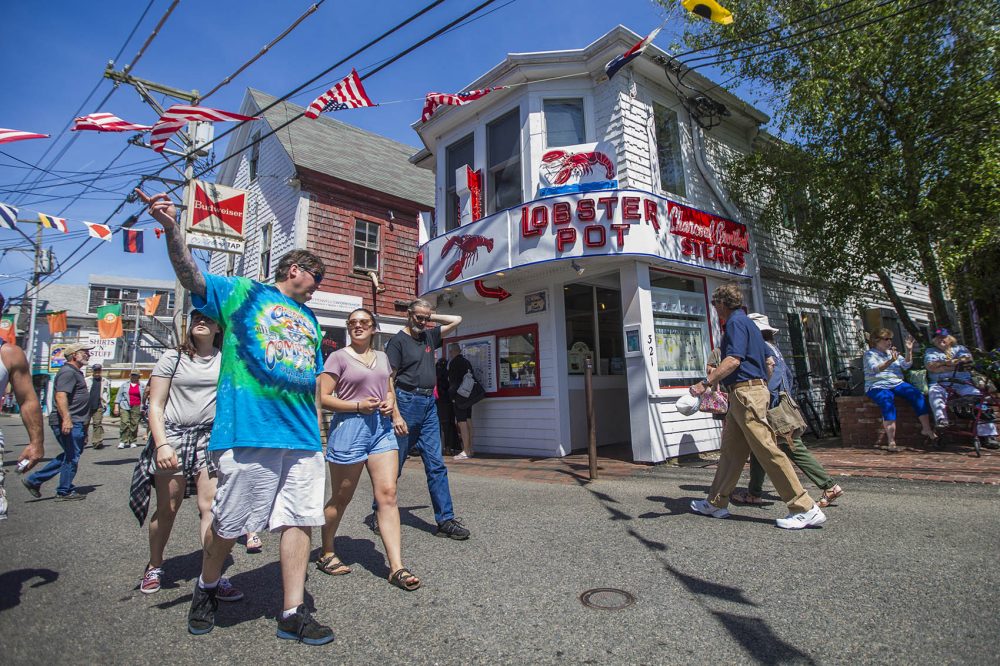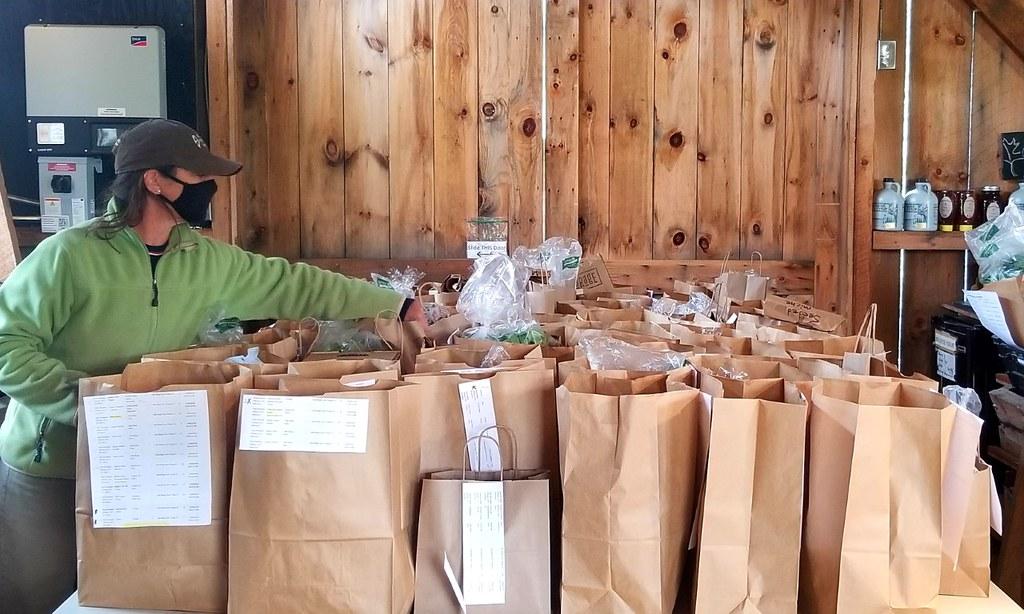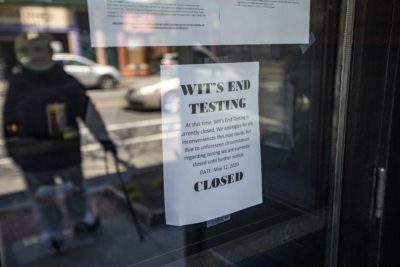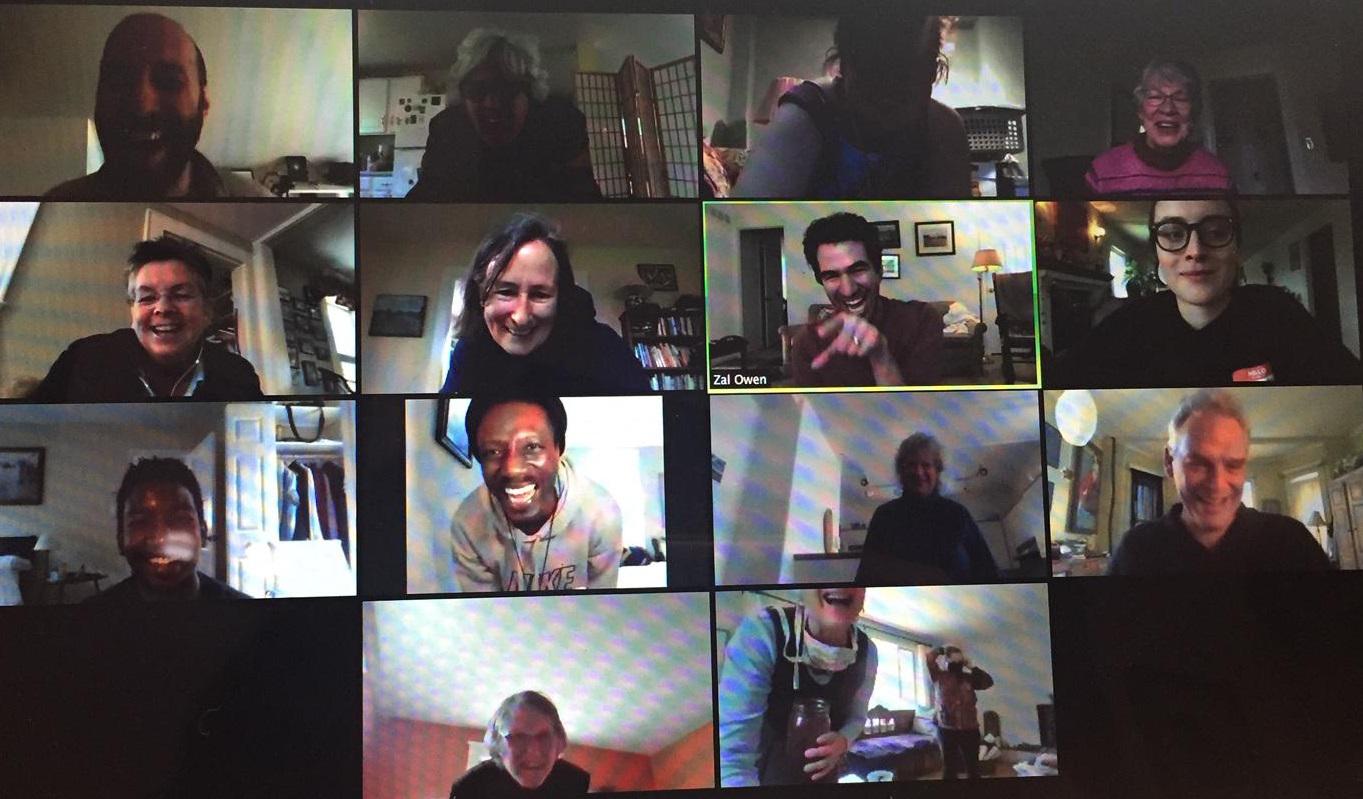Episode 199: The Complications of Reopening; Students Sue Universities in New England Over Remote Classes
This week on NEXT: A slow reopening is now underway in every New England state. But the uncertainty over COVID-19 is prompting some businesses on Cape Cod to scale back or not reopen at all. Plus, colleges in New England are facing lawsuits from students who allege they didn’t get the education they paid for this spring. And we hear about a laughing club that is trying to bring levity to current circumstances.
Businesses Weigh Reopening Ahead Of Uncertain Summer Season

Tourists walk down Commercial Street in Provincetown, Mass. (Jesse Costa/WBUR)
As all New England states continue to slowly lift restrictions, many businesses are still wrestling with uncertainties around COVID-19, safety and the reopening process. As WBUR’s Zeninjor Enwemeka reports, this has pushed some businesses on Cape Cod to scale back their operation or consider not opening at all.
“I would love to return to work, but only if it’s safe for me and my customers,” said Amy Kelly, owner of Moon Compass Studio in Mashpee, Mass.
We also have an update on last week’s story about Connecticut allowing hair salons and barber shops to reopen on May 20. Some hair stylists said they were worried about safety, citing the lack of physical distancing from their clients. Now Connecticut’s governor has reversed course, saying he’ll keep salons and barber shops closed until at least June 1 to better align with Rhode Island’s reopening plans.
Some business owners celebrated the decision. But Valerie DeVito, who already bought as much personal protective equipment as she could to reopen this week, told Connecticut Public Radio that she was frustrated by the last-minute change.
“I don’t understand how a day-and-a-half before we’re supposed to open — with all of the preparation and everything that we’ve done — all of a sudden it’s not safe to open?” DeVito said.
Maine Farms Welcome A Surge In CSA Membership Sales

At Little Ridge Farm in Lisbon Falls, Maine, owner and farmer Keena Tracy started an online ordering system called Farm Drop. (Susan Sharon/Maine Public)
The empty shelves at grocery stores during the pandemic and possible disruptions to the food supply chain have appeared to spark more interest in locally produced food. In Maine, Susan Sharon of Maine Public Radio reports on the surge of people buying CSA — or community supported agriculture — memberships. And in Massachusetts, WGBH‘s Stephanie Leydon talked to local meat producers who said demand is on the rise.
Vermont Public Radio looked into whether Vermont farms could feed all state residents if there was a food shortage. The podcast “Brave Little State” has more here.
College Students Sue Their Schools, Alleging Inadequate Remote Classes
The COVID-19 pandemic prompted colleges and universities to shift spring classes to remote learning. Now some of those institutions are facing class-action lawsuits from students claiming they did not get the education they paid for after the transition to online courses. The University of Connecticut, Boston University and Brown University are among the colleges in New England being sued.
“There’s a difference in terms of the quality of instruction,” said Steve Berman, managing partner of Hagens Berman law firm, who represents a student suing Brown in Providence, Rhode Island. “It’s not even close to the same experience.”
Berman, who is also representing other students suing a number of colleges, told NEXT he has been strategic about which lawsuits he takes on — declining to sue smaller schools that may go out of business or can’t afford refunds.
“That doesn’t mean that parents or students shouldn’t get those refunds,” he said. “I just think it’s not realistic to expect all colleges and universities to be able to do that.”
As of September 2019, Brown’s endowment was $4.2 billion. Berman argued that puts the university in a better position to “tackle the financial hardship than the parents and the students.”
Brown spokesman Brian Clark said the Ivy League university has credited unused room and board fees for students. But he said they are not refunding tuition.
“Tuition pays for learning,” Clark wrote in a statement to NEXT. “While learning remotely, students continue to receive a world class education and to earn academic credit toward completion of their degrees. The core value of a Brown education has not changed.”
Was That COVID-19? Antibody Tests Promise Answers, But Beware Of Their Limits

A sign on the door of the Cambridge, Mass. bar Wit’s End informing people they are closed. The bar was offering COVID-19 antibody testing, but then the city ordered it shut down. (Jesse Costa/WBUR)
It’s not clear yet whether people who have previously been infected with COVID-19 become immune — and if so, for how long. Tests for the coronavirus antibodies that could indicate immunity are already available in Massachusetts and other parts of New England. But as WBUR’s Carey Goldberg reports, there are many lingering questions about how to interpret the results.
A Laughing Club For When Life Isn’t That Funny

The Pioneer Valley Laughing Club on Zoom. (Screen Shot/Karen Brown/New England Public Radio)
It’s not easy to find much that’s lighthearted in today’s world. As New England Public Radio‘s Karen Brown reports, that’s why a western Massachusetts acting teacher created the Pioneer Valley Laughing Club — a chance to act like things are funny even when they’re not.
NEXT Wants to Hear From You:
Last week, we asked you to share how you’re feeling about states reopening and life entering yet another “new normal.” Katharine Weber had this to say on Twitter:
“We are only at the end of the beginning, not the beginning of the end! I worry that changing the guidelines will cause people to drop appropriate behavior entirely.”
During the lockdown phase, our NEXT team has been watching the Michael Jordan documentary series “The Last Dance,” playing lots of word games and enjoying more chocolate cake than usual (the store-bought boxed kind, not from scratch). How about you? Have you been able to find new sources of joy during the pandemic? Tell us!
Leave a voicemail on our comment line: 860-275-7595. Or shoot us an email at next@ctpublic.org. We look forward to hearing from you.
Also On This Week’s Show:
- Connecticut’s Reopening Presents New Challenges For Residents With Underlying Medical Conditions (Connecticut Public)
- A Vermont EMT Chronicles The ‘New Normal’ For First Responders (VPR)
- Tick Season: What To Do If You’ve Been Bitten (NHPR)
- 21-Year-Old Yale Student Becomes Principal Cellist In Major Orchestra (Connecticut Public)
About NEXT
NEXT is produced at Connecticut Public Radio
Host/Producer: Morgan Springer
Executive Editor: Vanessa de la Torre
Senior Director: Catie Talarski
Contributors to this episode: Karen Brown, Susan Sharon, Zeninjor Enwemeka, Frankie Graziano, Nicole Leonard, Anna Van Dine, Carey Goldberg, Taylor Quimby and Lori Mack.
Guest: Steve Berman
Music: Todd Merrell, “New England” by Goodnight Blue Moon, “Sequoia” by Binger, “Free” and “Save a Different Way” by Francesca Blanchard and “The Wolf” and “Every October” by Chris Ross and the North.
New to NEXT? You can find every episode or one you missed within our archives.
We want your feedback! Send critiques, suggestions, questions and ideas to next@ctpublic.org. Help us spread the word! If you like what you hear, rate and review us on iTunes.
